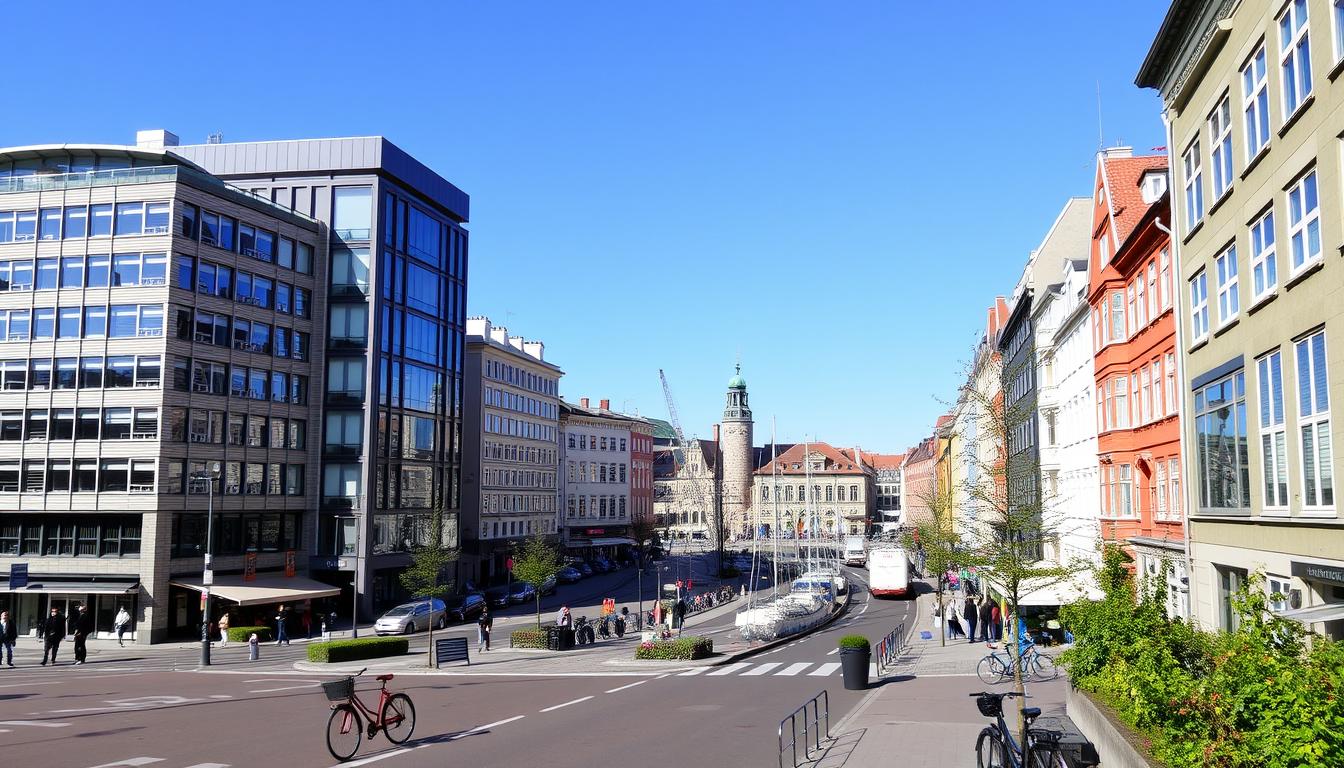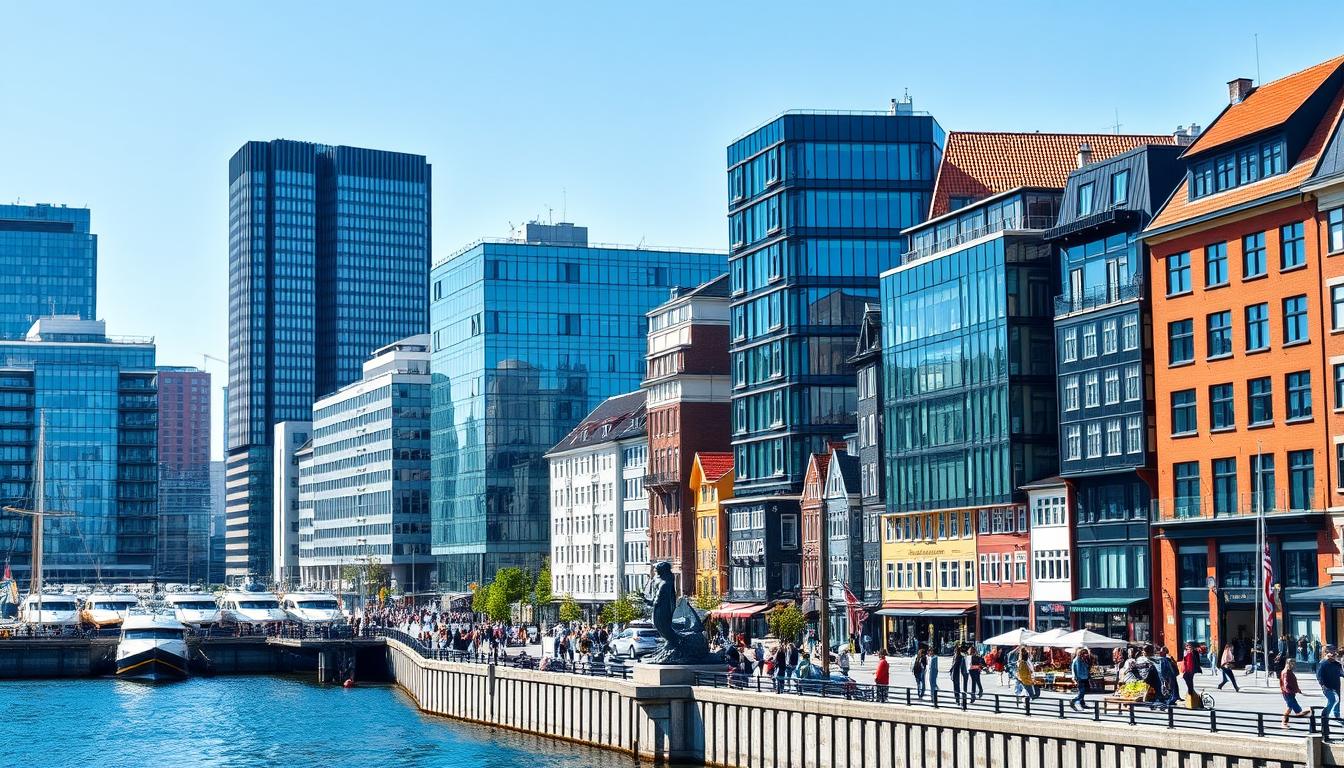Denmark
Denmark is a great place to grow your business, thanks to its strong economy and welcoming business environment. We help businesses enter the Danish market because we see the huge opportunities it offers. The country is leading in innovation, with a massive bioreactor and big investments in biosolutions.
Denmark’s location is perfect for reaching other Scandinavian countries and Europe. The EU Single Market has over 440 million consumers, making it easy to trade goods and services. Europe, including the UK and Germany, saw fast growth in hiring in 2023, showing Denmark’s vibrant business scene.
At LerriHost, we support you with services like company formation and financial advice. We also offer WordPress solutions for smooth operations and growth in Denmark. Taking informed steps to enter the Danish market can help you succeed and make the most of the opportunities here.
Understanding the Danish Market
Expanding into Denmark means knowing its economy well. Denmark’s economy is open and diverse, with a strong focus on international trade and welfare. Our Danish market insights show how digital solutions and green practices shape consumer and business decisions.
Overview of Denmark’s Economic Landscape
Denmark’s economy is advanced and varied, making it a key place for business growth. It has a strong public sector, a lively private sector, and a focus on tech innovation. Businesses in Denmark enjoy great infrastructure and connectivity, essential for smooth operations.
The Danish government plans to invest DKK 800 million in digital development from 2024 to 2027. They aim for 100% of households and businesses to have fast internet by 2025.
Key Industries in Denmark
The main industries in Denmark are IT, Renewable Energy, and Pharmaceuticals. These sectors are big contributors to the GDP and influence global trends. For example, electronic invoicing has been mandatory for business-to-government transactions in Denmark for over 15 years.
This system is very efficient, with 99% of invoices to the public sector being electronic.
Consumer Behaviour Trends
Knowing how Danish consumers behave is key for success in the market. They value sustainability and environmental friendliness in their choices. This affects what products they buy and which brands they support.
Danish tech readiness, like the OIOUBL electronic invoice format, supports this green focus. Businesses need to offer products that meet these consumer needs.
Benefits of Expanding to Denmark
Denmark is a great choice for businesses wanting to grow in the EU. It’s a gateway to Europe, giving businesses a big chance to grow and reach more customers. The country is known for its high standard of living, good business environment, and support for new ideas and startups.
Access to the EU Market
Expanding to Denmark means easy access to the EU’s 420 million consumers. Denmark is part of the Schengen Area, making travel easy across 26 countries. The corporate tax rate of 22% is also competitive, attracting big companies.
High Quality of Life and Business Environment
Denmark is known for its great quality of life and business-friendly environment. It ranks 4th in the World Bank’s Ease of Doing Business Index. The country has a high VAT rate of 25%, but it supports a strong welfare state and public services. People in Denmark enjoy a high GDP per capita, making the domestic market healthy and wealthy.
Innovative Ecosystem Support
Denmark is proud of its innovative ecosystem. It has strong startup accelerators, government funding, and partnerships with top research institutions. Venture capital investments in Danish startups have hit over €1 billion, showing the vibrant scene for new businesses. About 86% of Danes speak English, making it easier for foreign entrepreneurs to do business.
Expanding a business in the EU through Denmark is easier with help from companies like LerriHost. Denmark offers a lot of support, good economic conditions, and a creative environment. It’s a perfect place for businesses looking to enter the European market.
Legal Requirements for Business Establishment
Knowing the business laws in Denmark is key for any company wanting to start there. You need to understand the business registration process, Danish tax rules, and how to follow Denmark’s business laws. There are many legal points to think about.
Business Registration Process
Starting a business in Denmark has a clear process. The country is known for quick registration, often in just days. You must register with the Danish Business Authority and get a CVR number. This makes sure everything is clear and follows the rules.
Understanding Taxes and Duties
Getting to know Danish tax rules is very important. Denmark’s tax system is clear and attracts foreign investors. You’ll need to deal with corporate taxes and VAT, with a tax rate of 22%. Not following these rules can lead to big fines, up to €20 million or 4% of global turnover.
Also, you must think about local duties and excise taxes. These apply to certain industries.
Regulatory Compliance Overview
To follow Denmark’s business laws, you must meet many rules. You might need licenses from places like the Danish Financial Supervisory Authority for insurance work. You also have to get insurances like workers’ compensation and vehicle liability.
It’s also important to plan for operational costs. Not budgeting enough can cause cash flow problems. It’s wise to plan for at least a year’s expenses. Following GDPR and employee protection laws is also essential.
Navigating Cultural Differences
Understanding Danish business culture is key for success in Denmark. It’s about respecting their etiquette, valuing work-life balance, and clear communication.
Danish Business Etiquette
Danish culture values punctuality and formality a lot. Meetings are planned weeks ahead, and being late is seen as unprofessional. Business clothes are conservative, with a focus on calm colours.
Exchanging business cards at meetings is also common. These habits help build trust and successful business ties in Denmark.
Importance of Work-Life Balance
Danes really value work-life balance. This affects how businesses work, with a push for flexible hours. Employees are expected to leave on time and use their holidays.
Companies that support this balance see better productivity and happier staff. For international firms, matching this can boost workplace harmony and efficiency.
Communication Styles in Denmark
In Denmark, communication is direct and honest. People like clear, simple talks without extra details. This makes work more transparent and efficient.
Getting used to these communication styles helps you fit in better in Danish businesses. It also improves working with local partners. For more details, check out this guide on Danish business culture.
Funding Opportunities in Denmark
Denmark offers many funding options for businesses. This includes government grants, private investments, and EU financial aids. These choices make Denmark a great place for companies to grow or start new.
Government Grants and Subsidies
The Danish government helps projects with grants and subsidies. The Civil Society Fund (CSF) is a key programme. It supports partnerships between Danish groups and local partners in developing countries.
Funding in Denmark comes in different levels:
- Small Project funding up to DKK 150,000
- Large Project funding up to DKK 700,000
- Small Programme funding up to DKK 4 million
- Medium Programme funding up to DKK 15 million
- Large Programme funding up to DKK 27 million
There’s also co-financing from DKK 70,000 to DKK 1 million. Support for the application process and capacity analysis is available too. The deadlines for applications vary, with some due by June 11 and others by March 26.
Private Investment Options
Private investment in Denmark is strong and varied. The Danish Growth Fund and the Danish Venture Capital and Private Equity Association (DVCA) support many ventures. Angel investments usually range from €100,000 to €500,000.
Venture capital for early-stage companies is between €500,000 and €5 million. Sectors like fintech, cleantech, and healthtech attract a lot of investment. Denmark’s digital adoption rate also draws investors.
EU Funding Schemes
As an EU member, Denmark has access to EU financial aids. The Innovation Fund Denmark and Market Development Fund are key. There are also innovation vouchers and tax incentives for R&D.
In summary, Denmark’s stable and transparent business environment is attractive. Copenhagen is a hub for startups, drawing investors from around the world.
Establishing a Local Presence
To succeed in Denmark, you need a smart plan for your office locations and hiring. A local presence helps your business thrive in Denmark’s economy. It also boosts your efficiency and reach in the market.
Choosing the Right Location
Finding the perfect spot for your business in Denmark is key. Places like Copenhagen have lively business areas that can make your company stand out. But, these areas might cost more.
Cities like Aarhus and Odense are cheaper but offer great market access. Think about how easy it is to get there, the market size, and what you can afford.
Finding Office Spaces and Facilities
After picking a location, finding the right office is next. Local property experts and services like LerriHost can help a lot. They know the best places for your business, from modern coworking spaces to traditional offices.
Hiring Local Talent
It’s important to hire from Denmark’s skilled workforce. Denmark has a highly educated and multilingual population. This means you can find professionals with the right skills for your business.
Creating a talent plan that fits local culture and expectations will attract the best people. This will help your company grow and innovate.
Marketing Your Business in Denmark
Marketing in Denmark needs a smart plan that fits local tastes and trends. Knowing what makes the Danish market special can really boost your marketing.
Effective Marketing Strategies
Getting to know Danish shoppers is key. They love being open, green, and getting top-notch products. So, your ads should show these values clearly. Highlighting the quality and ethics of your goods is a smart move.
Also, using data to shape your marketing makes sure your message reaches the right people. This way, your ads are more likely to connect.
Utilising Digital Marketing Channels
Digital marketing is a must in Denmark, thanks to its tech-savvy people. Sites like Facebook, Instagram, and LinkedIn are big hits. SEO and content marketing help you get noticed online.
PPC ads can quickly grab attention and draw in new customers. They’re a fast way to get your brand seen.
Building Brand Recognition
Building a strong brand in Denmark means being consistent everywhere. Talk to your followers on social media, blogs, and emails. This builds a solid online presence.
Working with local influencers can also boost your brand’s image. With smart digital marketing, you can keep people interested and grow a loyal fan base in Denmark.
Networking and Partnerships
Networking and building partnerships are key for businesses in Denmark. The competitive landscape offers many chances for business networking, which leads to long-term, beneficial alliances. Denmark’s location in Europe and ease of doing business make it a great place for trade partnerships.
Joining Local Business Networks
Getting involved in local business networks is vital. It helps build important connections and understand the Danish business scene. Joining groups like the Danish Chamber of Commerce or the Confederation of Danish Industry can help. It gives access to valuable resources.
Opportunities for Collaboration
Working with Danish companies can boost growth and innovation. Companies like LerriHost and Piaster Revisorerne offer great support for partnerships. Also, trade partnerships in Denmark are encouraged by the market’s collaborative nature. This helps businesses expand and succeed.
Attending Trade Shows and Conferences
Going to business conferences in Denmark is a great chance. It lets you show your products, meet new partners, and learn about trends. Events like TechBBQ, Copenhagen Fintech Week, and the Copenhagen Business Summit are key. They help make new connections and find partnership chances.
Exploring the world of business networking in Denmark is essential. It’s about making strategic trade partnerships in Denmark and using the benefits of business conferences in Denmark. This way, businesses can confidently and wisely enter this promising market.
Understanding Labour Laws in Denmark
It’s vital for businesses to understand Danish employment law. This ensures they follow the rules and keep a good work environment. Denmark’s labour laws are strong, giving workers many protections. These include detailed employment contracts and generous leave policies.
Employment Contracts and Regulations
All employers in Denmark must give their employees written contracts. These contracts outline the job, hours, and terms of work. Denmark doesn’t have a minimum wage; wages are set through talks between employers and workers.
For workers under the Salaried Employees Act, the trial period is 3 months max.
Working Hours and Leave Policies
Danish law says you can’t work more than 48 hours a week on average over four months. Overtime pay is 150% to 200% of regular pay for extra hours. Workers get at least 25 paid days off each year, earning 2.08 days per month.
Parents can take up to 52 weeks of partially paid leave together. Workers can also get up to 22 weeks of sick pay in nine months, with a max of 4695 DKK a week.
Employee Rights and Benefits
Danish employee rights are wide-ranging. They include notice periods that change with how long you’ve worked. For example, those with 12 to 17 years of service get 2 months’ pay when they leave. Those with over 17 years get 3 months’ pay.
Danish labour laws create a solid support system for workers. This helps make Denmark a great place to work.
To learn more about following labour laws when starting a business, looking at international examples like Austria can help. You can find out more about these practices here.
Adapting Your Product or Service
To succeed in Denmark, focus on product adaptation. Make sure your products meet local tastes and standards. Consider cultural differences, customise services, and adjust prices for the Danish economy.
Cultural Considerations for Product Design
Danish people love quality and practicality. So, design products with their tastes and values in mind. Colours and symbols mean different things in Denmark than elsewhere. Knowing this can help your product be well-received and build loyalty.
Customising Services for Danish Consumers
To do well in Denmark, tailor your services to their needs. This might include special features or support that locals appreciate. Companies like McDonald’s have succeeded by adapting their menus to local tastes. This approach can work for service-based businesses too.
Pricing Strategies in Denmark
Setting the right prices in Denmark is vital. Prices must match the local economy and what people can afford. If prices are too high, you might lose customers. But, if they’re too low, it can damage your brand’s image. IBM’s pricing strategies offer a useful example.
For success, be flexible with your product and service offerings. Keep an eye on what customers say and how the market changes. Being quick to adapt and culturally aware will help your brand grow in this rich and varied market.
Challenges of Expanding to Denmark
Expanding a business internationally can bring new opportunities. But, it also comes with challenges. When looking to expand to Denmark, businesses face unique obstacles. We’ll look at some of these challenges, like barriers to entry, understanding local competition, and managing currency risks.
Potential Barriers to Entry
Denmark’s regulatory environment is supportive but can be challenging for new businesses. It’s important to understand local regulations to comply and position your business well. Tax laws, treaties, and financial regulations need careful thought to ensure smooth expansion.
Seeking advice from experts in market research, financial planning, and risk management can help. They can make navigating these challenges easier.
Understanding Local Competition
Doing a deep dive into Denmark’s competitive market is key for new businesses. Knowing your competitors and their strategies is vital. It can make all the difference between success and failure.
Understanding local consumer trends and the competitive landscape is essential. Companies like Ørsted have shown the importance of staying on top of market changes.
Managing Currency Risks
Denmark’s currency, the Danish krone (DKK), can be volatile. This can affect your profits and financial stability. Businesses need strong financial strategies and risk management practices.
Regular audits and clear financial records are important. Paying close attention to currency exchange rates and using hedging strategies can help manage risks.
In conclusion, Denmark is a great place for business expansion. But, it’s important to be aware of and plan for challenges. By tackling barriers to entry, understanding local competition, and managing financial risks, businesses can thrive in this dynamic market.
Building Customer Relationships
Building strong customer relationships in Denmark is key for any business. It’s about great customer service, good client communication in Denmark, and using feedback well.
Importance of Customer Service
Customer service is the base of customer relationships in Denmark. It’s not just fixing problems, but making every interaction positive. Brands like Topdanmark focus on empathy and clear communication.
Effective Communication with Clients
Good client communication in Denmark is vital. CRM systems give a full view of each customer. This can lead to a 47% increase in keeping customers.
Customised messages keep customers interested, boosting sales by 29%.
Gathering Feedback and Making Improvements
Listening to customer feedback in Denmark helps improve. Businesses that listen can solve problems fast. CRM systems can raise satisfaction by 20%.
Personalised marketing can increase engagement by 30%, building loyalty. These steps improve customer experience and business growth.
In short, good client communication, top-notch service, and feedback are essential. They help keep customers and lead to success.
Evaluating Success Metrics
For businesses aiming to excel in Denmark, it’s vital to focus on business metrics and set clear goals. Tracking key performance indicators (KPIs) helps improve and make informed decisions. By doing market research in Denmark, businesses can get insights that shape their strategies and help achieve their goals.
Key Performance Indicators to Track
Measuring success means finding the right KPIs. Articles with companies get 3–4 times more engagement than those without, says the Media Rating Council. Yet, only 35% of PR pros are confident in measuring campaign success, despite 88% making it a priority.
Businesses should use both traditional and digital indicators, like website traffic and social shares. Companies with advanced attribution models see a 31% higher PR ROI. This shows the value of detailed tracking methods.
Establishing Goals and Objectives
Setting SMART goals is key to aligning business objectives with strategy. Over 60% of companies use KPIs for risk management and goals. Regular reviews keep KPIs relevant and in line with business changes.
Getting stakeholders involved in KPI development makes them more relevant and effective.
Conducting Market Research for Insights
Comprehensive market research in Denmark is essential for strategic planning. LerriHost and others help with this research to spot trends and shifts in consumer behaviour. Companies with PR measurement dashboards are 2.5 times more likely to get more budget.
Keeping an eye on KPIs helps maintain compliance, like ISO 27001, and supports growth.
Future Trends in the Danish Market
Looking ahead, it’s vital to spot and adapt to new trends in the Danish market. Sustainability, tech leaps, and changing what people want are key areas. Businesses need to be quick and creative to keep up.
Sustainability and Environmental Concerns
Denmark is at the forefront of going green, with big efforts to cut carbon emissions and boost eco-friendly tech. Lun Energy got €10.3 million to help lower building emissions. The Danish government is also spending DKK 30 billion to make homes more energy-efficient.
This focus on the environment opens up chances for companies with green solutions. It’s a great time for businesses to offer eco-friendly products and services.
Technological Advancements
The Danish tech startup scene is set to grow by 8% in 2025, beating Europe’s average. Flatpay and ComplyCloud are examples of thriving tech companies. They show the exciting tech landscape in Denmark.
By keeping up with Denmark’s tech trends, businesses can tap into new opportunities. This includes AI, fintech, and more. New products and services can make operations smoother and give you an edge over rivals.
Changing Consumer Preferences
Knowing what customers want is critical for success in Denmark. The Buy Now, Pay Later (BNPL) market is booming, expected to hit US$6.31 billion by 2025. This shows Danes prefer flexible payment plans.
There’s also a shift towards experiences over things. Holdbar’s $3.5 million funding shows this trend. To stay relevant, businesses must adapt their offerings to meet these changing desires.

Pros and Cons of Expanding Your Business to Denmark
Discover the advantages and challenges of business expansion in Scandinavia with our balanced guide on the pros and cons of expanding your business to Denmark.

Structural business statistics in Denmark
Structural business statistics (SBS) are key to understanding Denmark’s economic framework. They give us detailed insights into business performance and ...

Starting a Business in Denmark: Branch vs Subsidiary
When thinking about starting a business in Denmark, we face a choice between a branch or a subsidiary. It’s not ...

Relocating to Denmark for business
Explore the essentials of relocating to Denmark for business with our comprehensive guide. Understand visas, taxes, culture, and living costs.

Lucrative Business Ventures in Denmark 2025
Explore the top business ideas to start in Denmark and tap into lucrative markets for success in 2025. Uncover your next venture today.

Understanding Business Culture in Denmark
Explore the nuances of business culture in Denmark to navigate negotiations, networking, and corporate etiquette with confidence.

Navigating Business Banking in Denmark – Insights
Explore our essential guide to Business Banking in Denmark, designed to help UK firms manage their finances effectively across borders.

Doing Business in Denmark: A Guide for Entrepreneurs
Explore the essentials of doing business in Denmark with our comprehensive guide for savvy entrepreneurs seeking opportunities in the Danish market.
Are you planning to Start a business in Denmark? Is it better a Branch or Subsidiary for Denmark?
